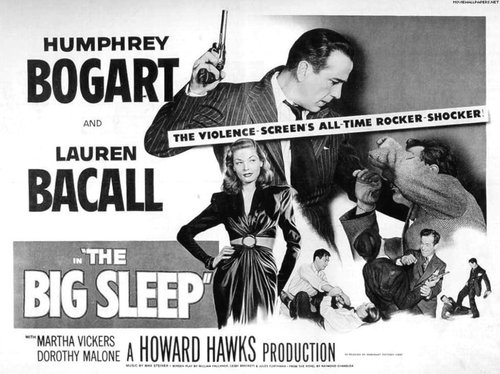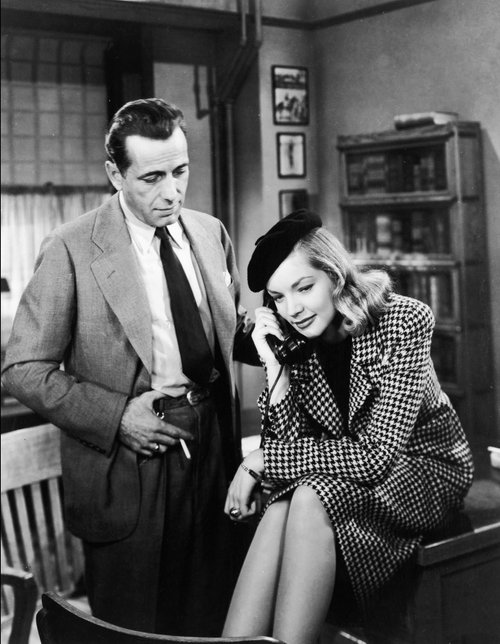This week on CineTV.blog, we’re asked to write about a film that uses vintage technology, with vintage tech being defined as anything pre-2000. With this in mind, my Bonnie Bride and I sat down to watch one of my favorite detective films, The Big Sleep (1946), staring Humphrey Bogart as Philip Marlowe and Lauren Bacall as Vivian Sternwood Rutledge. In brief, this is a hard-boiled detective yarn where Marlowe is hired to deal with a blackmailer, but circumstances quickly change as the number of dead bodies piles up.

The Big Sleep poster - IMDB
As for why I selected this film for vintage tech, that’s because of the use of rotary-dial telephones, which is a very extinct technology today, but highly visible in The Big Sleep in various scenes and different forms, from your regular desktop model to a wall hung pay phone. I know, there may be some people asking, “what’s a pay phone”? Very extinct technology. Except in film.

Bogart and Bacall in The Big Sleep (1946) - IMDB
One scene where the rotary-dial phone in Marlowe’s office plays an important role is when Vivian starts to call the police, resulting in Marlowe snatching the handset and begins to play a game of who called who with the police desk sergeant, and the two pass the receiver back and forth until the cop hangs up, exasperated with being jerked around. Bacall and Bogart showed a nice bit of on screen chemistry in the banter they used on the poor guy on the other end of the line. It was this scene that prompted my choice of film for this week.
Pay phones are also used in a couple of scenes by Marlowe. It is interesting how common these were up until the advent of cheap cell phones and service. As a bit of interest, when I was stationed in Spain, I didn’t have a phone in my off-base apartment, too darned expensive, so if I had to make a call to my unit, I had to head to a nearby pay phone. Upside, no scam calls trying to bilk me out of my hard earned money. Back to the film. The pay phones were situated on a wall in a bar in one case and a diner in the other. Marlowe had to hold the ear piece in one hand and speak into the microhone, as opposed to the standard handset that contained both speaker and microphone in one unit that I was familiar with.
The Big Sleep also raises the point that not all houses, or businesses, had a telephone. This was one of the key points as the film moves to its climax. Marlowe was being held in a rural location, and it is mentioned that Canino (Bob Steele), who is the main tough henchman, had to drive seven miles to get to a telephone to call his boss for instructions. This was an important point as it helped set the scene for the final confrontation with the boss when, switching locations, Marlowe calls the boss dude, Eddie Mars (John Ridgely), and sets the trap.
Today, this kind of setup involving telephones wouldn’t have worked as most people have cell phones, and with a quick text message or phone call, Canino would have gotten the information he needed from his boss; Caller ID would have tipped off Mars that Marlowe was at the location already setting up a trap; and there are other possibilities that modern tech would have foiled, like fooling with the desk sergeant.
If you aren’t familiar with CineTV.blog or their contests, please check out this week’s contest at - https://peakd.com/hive-121744/@cinetv/cinetv-contest-78-favorite-movie-with-vintage-technology
Thanks for stopping by.
Posted using CineTV